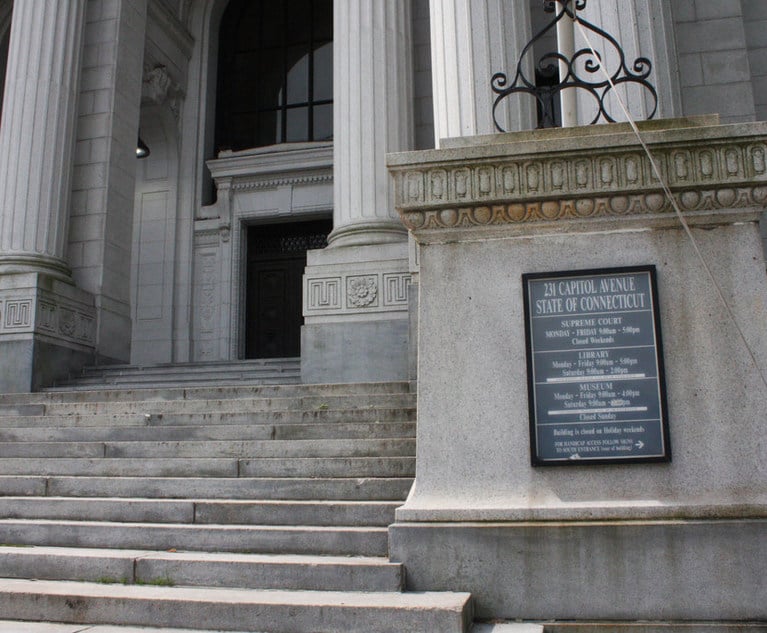 Joette Katz, a partner with Shipman & Goodwin. Courtesy photo.
Joette Katz, a partner with Shipman & Goodwin. Courtesy photo. SCOTUS Ruling Preserves Best Interests of Native American Children and Families
The high court dismissed the contention that ICWA goes beyond the power that the Constitution gives Congress in Article I, which authorizes Congress to "regulate commerce" with Indian tribes.
June 22, 2023 at 02:48 PM
9 minute read
CommentaryLast week the Supreme Court of the United States issued one of its most important decisions of the year, Haaland v. Brackeen, in which the court affirmed the constitutionality of the Indian Child Welfare Act (ICWA), a federal law that protects the well-being and best interests of Indian children and families. This was the U.S. Supreme Court's first ruling on ICWA since Adoptive Couple v. Baby Girl, the 2013 decision in which a 5-4 court ruled that a Cherokee father couldn't rely on ICWA to block his biological child's adoption. Since that time, the structure of the Supreme Court has changed, and eyes were on Justice Neil Gorsuch. In my view, he did not disappoint.
But first some history. Congress enacted ICWA in 1978 to re-establish Tribal authority over the adoption of American Indian and Alaska Native (AI/AN) children. Its goal was to strengthen and preserve Native American family structure and culture. Legislative history showed that between 25% and 35% of all Native children were being removed from their homes by state child welfare and private adoption agencies, and that of those, 85% were placed with non-Native families, even when fit and willing relatives were available. ICWA was intended to be a safeguard that requires placement cases involving Native American children to be heard in tribal courts, and when possible, permits a child's tribe to be involved in state court proceedings.
This content has been archived. It is available through our partners, LexisNexis® and Bloomberg Law.
To view this content, please continue to their sites.
Not a Lexis Subscriber?
Subscribe Now
Not a Bloomberg Law Subscriber?
Subscribe Now
NOT FOR REPRINT
© 2025 ALM Global, LLC, All Rights Reserved. Request academic re-use from www.copyright.com. All other uses, submit a request to [email protected]. For more information visit Asset & Logo Licensing.
You Might Like
View All
Coerced Confessions and the Burden of Proof Beyond Reasonable Doubt


35 Years After CT's Affordable Housing Act, Progress Remains a Struggle
4 minute readLaw Firms Mentioned
Trending Stories
- 1Thursday Newspaper
- 2Public Notices/Calendars
- 3Judicial Ethics Opinion 24-117
- 4Rejuvenation of a Sharp Employer Non-Compete Tool: Delaware Supreme Court Reinvigorates the Employee Choice Doctrine
- 5Mastering Litigation in New York’s Commercial Division Part V, Leave It to the Experts: Expert Discovery in the New York Commercial Division
Who Got The Work
J. Brugh Lower of Gibbons has entered an appearance for industrial equipment supplier Devco Corporation in a pending trademark infringement lawsuit. The suit, accusing the defendant of selling knock-off Graco products, was filed Dec. 18 in New Jersey District Court by Rivkin Radler on behalf of Graco Inc. and Graco Minnesota. The case, assigned to U.S. District Judge Zahid N. Quraishi, is 3:24-cv-11294, Graco Inc. et al v. Devco Corporation.
Who Got The Work
Rebecca Maller-Stein and Kent A. Yalowitz of Arnold & Porter Kaye Scholer have entered their appearances for Hanaco Venture Capital and its executives, Lior Prosor and David Frankel, in a pending securities lawsuit. The action, filed on Dec. 24 in New York Southern District Court by Zell, Aron & Co. on behalf of Goldeneye Advisors, accuses the defendants of negligently and fraudulently managing the plaintiff's $1 million investment. The case, assigned to U.S. District Judge Vernon S. Broderick, is 1:24-cv-09918, Goldeneye Advisors, LLC v. Hanaco Venture Capital, Ltd. et al.
Who Got The Work
Attorneys from A&O Shearman has stepped in as defense counsel for Toronto-Dominion Bank and other defendants in a pending securities class action. The suit, filed Dec. 11 in New York Southern District Court by Bleichmar Fonti & Auld, accuses the defendants of concealing the bank's 'pervasive' deficiencies in regards to its compliance with the Bank Secrecy Act and the quality of its anti-money laundering controls. The case, assigned to U.S. District Judge Arun Subramanian, is 1:24-cv-09445, Gonzalez v. The Toronto-Dominion Bank et al.
Who Got The Work
Crown Castle International, a Pennsylvania company providing shared communications infrastructure, has turned to Luke D. Wolf of Gordon Rees Scully Mansukhani to fend off a pending breach-of-contract lawsuit. The court action, filed Nov. 25 in Michigan Eastern District Court by Hooper Hathaway PC on behalf of The Town Residences LLC, accuses Crown Castle of failing to transfer approximately $30,000 in utility payments from T-Mobile in breach of a roof-top lease and assignment agreement. The case, assigned to U.S. District Judge Susan K. Declercq, is 2:24-cv-13131, The Town Residences LLC v. T-Mobile US, Inc. et al.
Who Got The Work
Wilfred P. Coronato and Daniel M. Schwartz of McCarter & English have stepped in as defense counsel to Electrolux Home Products Inc. in a pending product liability lawsuit. The court action, filed Nov. 26 in New York Eastern District Court by Poulos Lopiccolo PC and Nagel Rice LLP on behalf of David Stern, alleges that the defendant's refrigerators’ drawers and shelving repeatedly break and fall apart within months after purchase. The case, assigned to U.S. District Judge Joan M. Azrack, is 2:24-cv-08204, Stern v. Electrolux Home Products, Inc.
Featured Firms
Law Offices of Gary Martin Hays & Associates, P.C.
(470) 294-1674
Law Offices of Mark E. Salomone
(857) 444-6468
Smith & Hassler
(713) 739-1250











